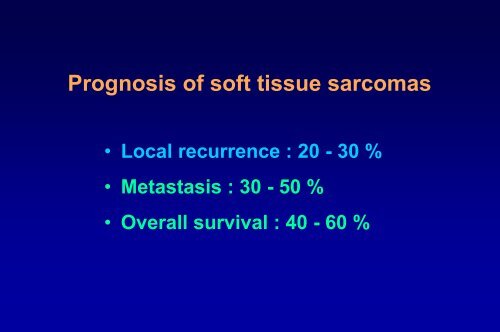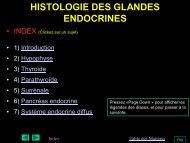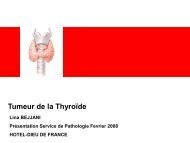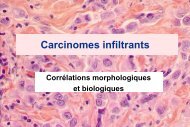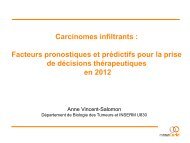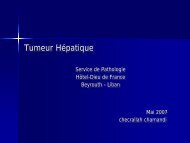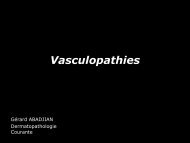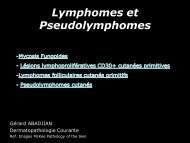Sarcomes des Tissus Mous Traitement - epathologies
Sarcomes des Tissus Mous Traitement - epathologies
Sarcomes des Tissus Mous Traitement - epathologies
You also want an ePaper? Increase the reach of your titles
YUMPU automatically turns print PDFs into web optimized ePapers that Google loves.
Prognosis of soft tissue sarcomas<br />
• Local recurrence : 20 - 30 %<br />
• Metastasis : 30 - 50 %<br />
• Overall survival : 40 - 60 %
Soft tissue sarcomas<br />
Treatment<br />
• Aims of treatment<br />
• Difficulty of treatment<br />
• Multidisciplinary approach<br />
• Importance of initial treatment
Soft tissue sarcomas<br />
Treatment<br />
• Natural history<br />
• Initial evaluation<br />
• Therapeutic tools<br />
• Indications
Soft tissue sarcomas<br />
Natural history<br />
• Locoregional extension<br />
• Metastases
Soft tissue sarcomas<br />
Locoregional extension<br />
• Pseudo encapsulation<br />
• Superficial tumors<br />
• Intra-compartimental tumors<br />
• Extra-compartimental tumors<br />
• Lymph node extension
Soft tissue sarcomas<br />
Locoregional extension<br />
• Pseudo encapsulation<br />
• Superficial tumors<br />
• Intra-compartimental tumors<br />
• Extra-compartimental tumors<br />
• Lymph node extension
Soft tissue sarcomas<br />
Locoregional extension<br />
• Pseudo encapsulation<br />
• Superficial tumors<br />
• Intra-compartimental tumors<br />
• Extra-compartimental tumors<br />
• Lymph node extension
Intra comp.<br />
• Superficial<br />
• leg comp.<br />
• Thigh comp.<br />
• buttock<br />
• forearm comp.<br />
• Arm comp.<br />
• periscapular<br />
Soft tissue sarcomas<br />
Compartiments<br />
Extra comp.<br />
• Superf. and deep<br />
• popliteal area<br />
• inguinal area<br />
• pelvis<br />
• axillary area<br />
• periclavicular<br />
• paraspinal<br />
• head and neck
Soft tissue sarcomas<br />
Lymph node extension<br />
• Rare (< 5 %)<br />
• Lymph node excision not required<br />
• = M+
Soft tissue sarcomas<br />
Metastases<br />
• Vascular extension<br />
• Lung<br />
• Early metastases
Soft tissue sarcomasMétastases :<br />
localisations<br />
(Data base GSF - n = 694)<br />
• Lung 70 %<br />
• Lymph node 12 %<br />
• Bone 9 %<br />
• Pleura and peritoneum 8 %<br />
• Liver 7 %<br />
• Others 18 %
Soft tissue sarcomas<br />
Metastases : time of outcome<br />
(Data base GSF - n = 694)<br />
• Initial 23 %<br />
• Before 1 year 54 %<br />
• Before 2 years 77 %<br />
• Before 5 years 95 %<br />
• After 10 years 1 %
Soft tissue sarcomas<br />
Pre-treatment examination<br />
• Locoregional extension :<br />
- clinical examination<br />
-RMI<br />
- CT-scan<br />
-Others<br />
• Metastases (lung):<br />
-X-ray<br />
- CT-scan
• Surgery<br />
• Radiotherapy<br />
• Chemotherapy<br />
Soft tissue sarcomas<br />
Therapeutic means<br />
• Isolated limb perfusion – TNF<br />
• Targeted molecular therapy
Soft tissue sarcomas<br />
• Excision<br />
• Wide resection<br />
Surgery<br />
• Compartimentectomy<br />
• Amputation
EXCISION
WIDE RESECTION
COMPARTMENT EXCISION
Soft tissue sarcomas<br />
Radiotherapy<br />
• Complementary to surgery<br />
• Volumes<br />
• Doses<br />
• Techniques
Soft tissue sarcomas<br />
Chemotheray<br />
• Efficient drugs :<br />
• Efficiency<br />
• Toxicity<br />
- doxorubicine<br />
- ifosfamide
Soft tissue sarcomas<br />
Chemotheray<br />
• Palliative<br />
• Adjuvant<br />
• Neo-adjuvant
Isolated limb perfusion with TNF<br />
• Irresectable tumors of the limbs<br />
• ECC of limb + hyperthermy + TNF +<br />
melphalan<br />
• Complete response in 50% of cases<br />
• Technically difficult
Targetd molecular therapy<br />
• Anti-tyrosine kinases : STI571 (GIST)<br />
• New anti-tyrosine kinases<br />
• Anti-angiogenic factors<br />
• Multi-targeted treatment
GIST and STI571<br />
Signal<br />
mitogénique<br />
STI<br />
27 June 2000<br />
4 October 2000
Treatment of GIST with Glevec<br />
• 80% of immediate non-progression<br />
• about 10% of re-progression during the first year<br />
• minimal efficient dose = 400mg (cost = 2000 euros/month)<br />
• minor secondary effects<br />
• rare major secondary effects<br />
• length of treatment ?<br />
• Problem of progression ?<br />
• Adjuvant teratment ?
• Metastases ?<br />
Soft tissue sarcomas<br />
Therapeutic decision<br />
• Possible conservative treatment ?<br />
• Embryonal histologic type ?
M+<br />
CT<br />
± Ch<br />
± RT<br />
Treatment of soft tissue sarcomas<br />
Embryonal Tumor<br />
CT<br />
± Ch<br />
± RT<br />
M-<br />
Resectabl<br />
Ch<br />
± RT<br />
(± CT)<br />
Non-embryonal Tumor<br />
Irresectable<br />
CT ou ILP<br />
Clinical efficiency<br />
Ch<br />
histo. efficiency<br />
± CT ± RT
Soft tissue sarcomas<br />
Non-metastatic patients<br />
• Loco-regional treatment<br />
Resectable tumor<br />
→ conservative surgery<br />
± radiotherapy<br />
Irresectable tumor<br />
→ neo-adjuvant chemotherapy<br />
or ILP-TNF<br />
+ secondary surgery<br />
+ radiotherapy<br />
• Adjuvant chemotherapy
Soft tissue sarcomas<br />
Post-treatment-surveillance<br />
• Aims<br />
• Rythme<br />
• Means


